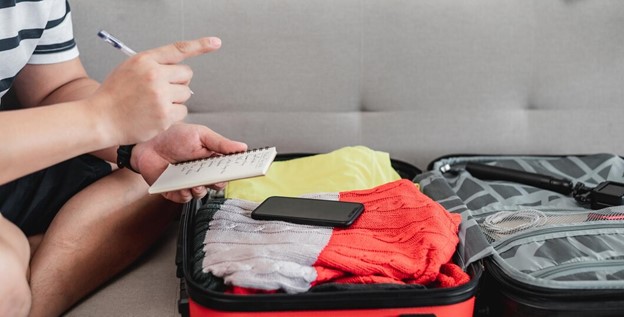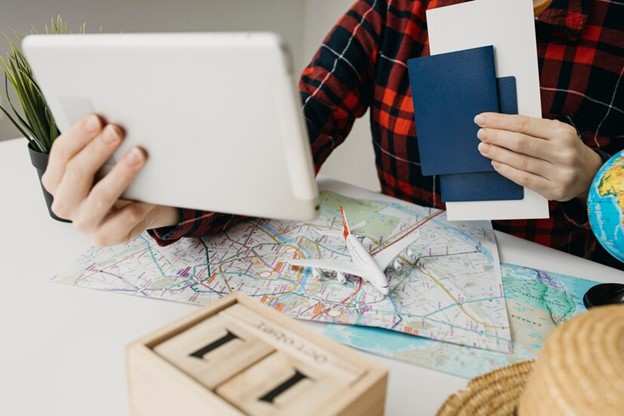Hygiene During Travel: Staying Clean on the Go
Whether you're soaring through the clouds on a long-haul flight, traversing landscapes on a scenic train journey, or immersing yourself in new destinations, prioritizing cleanliness is paramount for both comfort and health. In this extensive guide, we will explore various facets of travel hygiene, offering handy tips for before, during, and after your trip.
Why You Should Focus on Hygiene While Traveling?
Maintaining hygiene during travel is crucial for several reasons, encompassing both personal well-being and public health considerations. Exposure to unfamiliar environments, crowded spaces, and varied climates can increase the risk of contracting infections and illnesses.
Regular handwashing, proper sanitation practices, and a heightened awareness of personal hygiene help minimize this risk.
Moreover, staying clean and fresh contributes significantly to your physical comfort. Whether on a long-haul flight, a train journey, or exploring a new city, maintaining personal hygiene ensures that you feel more comfortable and at ease throughout your travels.
It is also worth remembering that traveling involves interacting with people from different regions and backgrounds. In many destinations, water and foodborne illnesses pose a significant risk to travelers. Adhering to proper hygiene practices helps prevent the spread of contagious diseases not only to yourself but also to the communities you visit.
Now that you understand why maintaining hygiene is so crucial during a trip, let's discuss how you can get started with it.
Pre-Travel Preparation

When it comes to personal hygiene, prep begins before you step outside your home. Consider the following tips for a hygiene-conscious pre-travel routine:
- Pack a Comprehensive Hygiene Kit: Start by preparing a compact hygiene kit containing travel-sized essentials such as hand sanitizer, wet wipes, bar soaps, tissues, toothbrushes, toothpaste, and a small towel. Depending on the destination, it might also make sense to pack mosquito and insect repellants. Having these items readily available ensures you can maintain cleanliness throughout your journey.
- Choose Travel-Friendly Clothing: Opt for breathable and easily washable clothing. Dark colors and patterns can help camouflage stains, while quick-dry fabrics are ideal for on-the-go hygiene.
- Research Destination-Specific Hygiene: Familiarize yourself with the hygiene standards of your destination. Different regions may have varying water quality and sanitation practices, influencing how you approach personal cleanliness.
- Personal Medications and First Aid Kit: Ensure you pack any necessary medications, along with a basic first aid kit. A headache or a small cut can be quickly addressed with these essentials.
Staying Clean During Commute
The confined spaces of airplanes, buses, and trains can make it challenging to maintain personal hygiene. Here are some tips to stay clean during your journey:
- Hand Hygiene is Paramount: Buses, flights, trains, and other modes of public transportation are communal spaces where germs can easily spread. Regularly wash your hands with soap and water when possible. In case water isn't available, use a hand sanitizer containing at least 60% alcohol. It is also a good idea to keep wet wipes handy to clean your hands.
- Wipe Down High-Touch Surfaces: Bring personal care wipes to clean the armrests, tray tables, and seatbelts in airplanes or trains. High-touch surfaces can harbor bacteria, and a quick wipe can significantly reduce your exposure to germs.
- Stay Hydrated: Airplane cabins can be dehydrating, affecting your skin and overall well-being. Drink plenty of water to stay hydrated and counteract the dry air. Consider bringing a refillable water bottle to minimize single-use plastic waste.
- Choose Your Seat Wisely: If possible, select a seat near the restroom to minimize the distance you have to travel for personal hygiene needs. Additionally, an aisle seat provides easier access to the washroom without disturbing fellow passengers.
Hygiene Tips for Your Stay
Your choice of accommodation plays a crucial role in maintaining hygiene standards during your travels. Whether it's a hotel, hostel, or Airbnb, consider the following:
- Room Inspection Protocol: Upon entering your accommodation, take a few moments to inspect the cleanliness of the room. Check for bedbugs, ensure the bathroom is spotless, and assess the general tidiness of the space.
- Bring Your Own Bedding: For those particularly concerned about cleanliness, consider bringing your own travel sheets or sleep sack. This extra layer can provide peace of mind and an added barrier between you and hotel linens. It is particularly helpful if you are prone to allergies.
- Water Safety Considerations: In regions where tap water quality is questionable, use bottled or filtered water for drinking and brushing your teeth. Avoid ice in drinks if you're unsure about the source of water.
Transportation Care

Whether you're renting a car, using rideshare services, or relying on public transportation, maintaining cleanliness extends beyond the journey itself. Here's how to keep your transportation clean:
- Inspect Rental Cars: Before driving off in a rental car, give it a quick once-over. Wipe down the steering wheel, gear shift, and door handles with wipes. This simple step can significantly reduce your exposure to germs.
- Rideshare Etiquette: If using rideshare services, be mindful of the cleanliness of the vehicle. Choose a seat that appears clean and consider carrying a small trash bag for your own waste.
- Public Transportation Hygiene: When using buses, subways, or trams, avoid touching your face and sanitize your hands after holding onto handrails or poles. Standing away from crowded areas can also minimize contact with potentially contaminated surfaces.
Post-Travel Requirements

After returning home, taking a few additional steps can help ensure a smooth transition back to your routine:
- Laundry and Cleaning Rituals: Unpack your bags promptly and launder your travel clothes, including your travel sheets or sleep sack, if used. Disinfect your suitcase and any other travel gear that may have come in contact with various surfaces.
- Personal Health Check: Monitor your health in the days following your journey. If you experience any symptoms of illness, seek medical attention promptly. Communicate any travel-related concerns with healthcare providers, especially if you've been to regions with specific health risks.
- Reflection and Future Planning: Take some time to reflect on your travel hygiene practices. Note what worked well and what could be improved. Use this information to improve your prep for future trips.
Final Thoughts
The significance of maintaining hygiene during travel extends far beyond personal comfort. It is an integral aspect of responsible and respectful global exploration. From safeguarding your health and preventing the spread of illnesses to respecting local customs and contributing to public well-being, adhering to proper hygiene practices is a fundamental responsibility for any traveler. This, in turn, creates a more enjoyable and fulfilling journey, allowing you to fully immerse yourself in the beauty and richness of your destination.
From carrying a personal hygiene kit to disinfecting high-touch surfaces in hotel rooms and rental cars, there's a lot you can do to maintain hygiene while traveling. By incorporating the aforementioned travel hygiene tips into your routine, you can make your journey more enjoyable and worry-free. Remember, a little preparation goes a long way in ensuring that your adventures are not only memorable but also hygienic. Safe travels!
